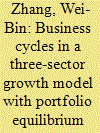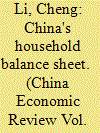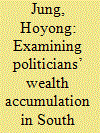|
|
|
Sort Order |
|
|
|
Items / Page
|
|
|
|
|
|
|
| Srl | Item |
| 1 |
ID:
159347


|
|
|
|
|
| Summary/Abstract |
This study generalises a growth model proposed by Zhang (2016) through allowing all the time-dependent variables to be time-dependent. Zhang’s model deals with dynamic interdependence between capital accumulation and environmental change, with portfolio equilibrium among land, gold and physical wealth in a multi-sector general equilibrium framework. The model explains the dynamics of prices, rents and distribution of land, gold, physical wealth and environmental change on the basis of micro-economic foundation. This article generalises the model to explain business cycles due to different exogenous shocks. We simulate the motion of the economy and conduct comparative dynamic analysis to demonstrate business cycles due to periodic oscillations in the propensity to use gold, the propensity to consume housing, the propensity to consume industrial goods, the propensity to consume agricultural goods, the propensity to save, and the tax rate on the consumption of industrial goods.
|
|
|
|
|
|
|
|
|
|
|
|
|
|
|
|
| 2 |
ID:
161874


|
|
|
|
|
| Summary/Abstract |
In this paper, we compile China's household balance sheet and apply this perspective to the analysis of household financial conditions. Specifically, we first address some technical issues on the balance sheet accounts, and detail the estimations of two important asset items, “dwellings” and “automobiles.” Next, through reading the sheets, we provide an international comparative analysis, and show: (1) China's households are still on their early stage of wealth accumulation, and this trend is associated with a changing structure in favour of financial assets. (2) Although being subject to relatively low insolvency and liquidity risks, the sector has experienced, generally contrary to major developed or emerging countries, a climbing leverage cycle since the global financial crisis. These findings imply that China's policymakers should, on the one hand, make further efforts to help households accumulate wealth with an improved structure in terms of liquidity and risk diversification, and on the other hand, need to pay high attention to the increasing household financial stress and the potential risk contagion.
|
|
|
|
|
|
|
|
|
|
|
|
|
|
|
|
| 3 |
ID:
172650


|
|
|
|
|
| Summary/Abstract |
One of the public’s popular beliefs about politics is that politicians engage in rent-seeking behaviors, such as accumulating property, using their political power. By applying a regression discontinuity design, this study examines whether members of the National Assembly of South Korea gained assets during three elective terms (2004–2008, 2008–2012, and 2012–2016). The results contradict the public’s claim. In general, there is minimal evidence that election winners accumulate more assets than runners-up. And observing the winners’ premium for newly elected politicians in the 2012–2016 term, I find that it is related to a political support fund, which is a legitimate channel for politicians’ funding. The results suggest that an information disclosure policy can play a pivotal role in restricting politicians’ rent-seeking behaviors.
|
|
|
|
|
|
|
|
|
|
|
|
|
|
|
|
| 4 |
ID:
182799


|
|
|
|
|
| Summary/Abstract |
Many scholars have evaluated the wealth creation effects of homeownership over different time periods and have agreed on the positive role of homeownership. However, there are no consistent mechanisms to measure the impact of homeownership on wealth inequality. Based on data from 1995 to 2018, this paper finds that the expansion of the homeownership rate in urban China was an equalizing force in the distribution of wealth from 1995 to 2008, driven by the increased homeownership and housing acquisition of low- and moderate-income households (LMIs) during the era of housing reform in the 1990s. The forces were exogenous and dominated by a redistributive logic. In the post-reform era after 2008, the decline in the homeownership rate led to a concentration of wealth distribution that was driven by the widening wealth gap between owners and non-owners, which represented an endogenous market force. The results indicate that there was an apparent discontinuity of the trends of homeownership and wealth inequality because new immigrants could not afford the price of housing in the cities. The wealth position of the middle and lower classes (mainly new immigrant non-owners) was crippled, not only by the inaccessibility of homeownership, but also by the reinforcing effect of the increase in housing prices. This study reveals the different mechanisms of homeownership on wealth inequality and the policy implications for the redistributive effects of the allocation of housing resources.
|
|
|
|
|
|
|
|
|
|
|
|
|
|
|
|
| 5 |
ID:
153014


|
|
|
|
|
| Summary/Abstract |
In the late nineteenth century, Anglo-Hindu and Anglo-Islamic inheritance law in British India treated women very differently. Anglo-Hindu inheritance law precluded women from both inheriting a portion of the estate and disposing of their property. Anglo-Islamic inheritance law allowed women to inherit property and did not restrict how they could use this property. The differing treatment of women by both systems allowed Anglo-Hindu inheritance law to encourage wealth accumulation, whereas Anglo-Islamic inheritance law encouraged estate fragmentation. An overview of both systems of inheritance law and case summaries illustrate how differences in the treatment of women affected the relationship between each system of inheritance law and wealth accumulation.
|
|
|
|
|
|
|
|
|
|
|
|
|
|
|
|
|
|
|
|
|